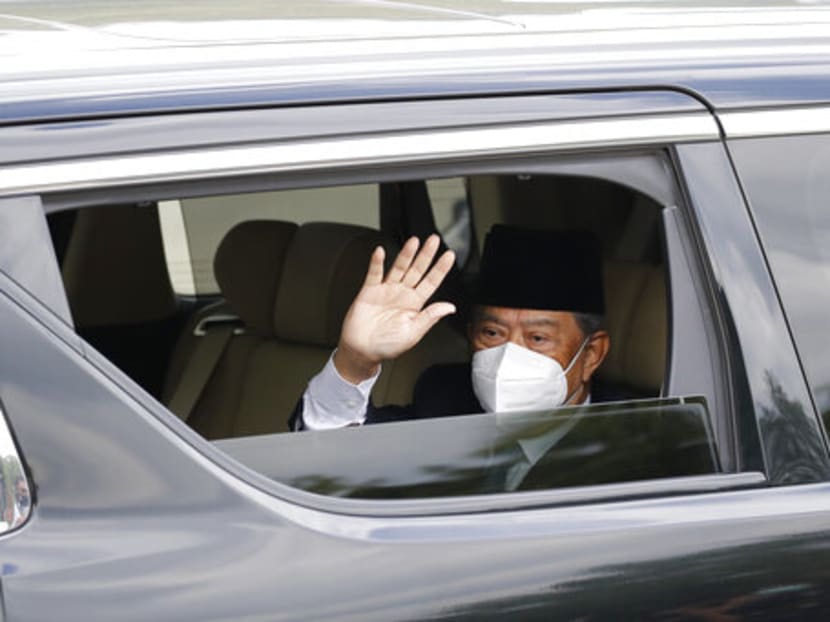Commentary: Muhyiddin’s resignation as prime minister paves way for opposition to seize power
The Pakatan Harapan may win back power if it stays united. It controls a huge number of seats. But it will not have the support of the Malay political establishment, says Professor James Chin.

HOBART: After a week of high political drama, the inevitable has occurred. Prime Minister Muhyiddin Yassin and his Cabinet resigned on Monday (Aug 16).
Muhyiddin had little choice. He had exhausted all possible avenues to stay in power.
Even his ultimate public display of desperation last Friday in going on national television to offer the opposition unprecedented reforms and sweeteners to back his government - term limits on the prime minister, reduction of the voting age, financial allocations for constituency work and granting the leader of the opposition the status of a senior minister – did not help.
Never mind that the opposition had asked for some of these precise changes for over 20 years or more.
Despite this very public mea culpa, leaders from all the major opposition parties rejected his peace offering. Only two senior Members of Parliament (MPs) from the Democratic Action Party (DAP) said it was worth “further discussion”.
By Sunday, it was all but over. In a final meeting with Perikatan Nasional coalition parties, Muhyiddin’s fate was sealed. Some political office holders started to clear out their offices.
THE KING WILL NEXT APPOINT A PRIME MINISTER, BUT WHO?
Under Malaysia’s federal constitution, the king has absolute discretion over who becomes prime minister. He can appoint any MP who commands the confidence of the Dewan Rakyat to form a new government.
His Majesty will have several considerations. First, the ideal candidate must have the gravitas, probably someone respected and senior like a party leader or elder statesman, who can bring different parties together.
Second, the chosen MP must be able to win a confidence vote when Parliament next sits. Muhyiddin resigned yesterday precisely because he knew he could not muster a majority in the upcoming parliamentary session in September.
There is no running away when a confidence vote is inextricably linked to the passing of the Malaysian Budget in October. Hence, the candidate must have in mind Budget measures that have the strong support of businesses and workers, and a sense of how to right the economy.
Third, the person must understand the public mood. People are fed up with the constant political infighting and the government’s inability to bring COVID-19 under control for the past year.
The ideal candidate should promise the new government will hold a general election sometime next year once COVID-19 is under control and an election can be held safely.
Staying until the end of the current term of government in 2023 is untenable. The public wants a say in how the present deadlock is broken, after 17 months of political paralysis.
The fact is Mahathir Mohamad’s resignation in February 2020 and the Pakatan Harapan’s (PH) loss of government created a crisis of legitimacy that Muhyiddin’s government has since been mired in.
A clear result from GE will clear the fog. This political stability in a multi-racial country in the middle of a pandemic is crucial for Malaysia is to recover and consolidate.
DOES THE OPPOSITION STAND A CHARGE OF SEIZING BACK POWER?
Ironically, the largest party in Parliament, the DAP, with 42 seats, will not likely be asked to form the government.
It is seen as a party with a minority Chinese base. DAP Secretary-General Lim Guan Eng will be unjustly disqualified when it comes to the prime ministership. The Malay political class, at present, cannot accept a non-Malay as prime minister.
The strongest politician on the opposition side is Anwar Ibrahim. Despite losing a dozen Parti Keadilan Rakyat (PKR) MPs since last year, he still commands the support of 34 others. The king can justifiably ask him to form a new government.
The only obstacle is the opposition to Anwar by the elite Malay establishment and conservative Islamic groups. If the two other PH parties DAP and Amanah stick with Anwar, he only needs slightly more than 20 seats to secure a majority.
These 20-something seats can easily be obtained if East Malaysian parties join them. Sarawak’s Gabungan Parti Sarawak coalition alone holds 18 MPs. Parti Warisan, PH’s ex-ally, can contribute eight MPs.
BUT UMNO APPEALS MORE TO ULTRA-CONSERVATIVE MALAYS
On the incumbent’s side, only UMNO, Malaysia’s dominant party for about 60 years, is a serious contender. It has 38 MPs if it is wholly united.
Although UMNO’s factionalism had accelerated Muhyiddin’s downfall, I expect UMNO to quickly unite once it is offered the prize of the prime ministership. UMNO’s big advantage is that it has the support of the Malay establishment.
The issue however is who is UMNO’s candidate for the top job? The party is in an unusual situation as two of its most senior leaders, party president Zahid Hamidi and ex-president Najib Razak, are both on trial for corruption.
The Agong is not likely to offer either the chance to form a government while their legal problems continue to brew. The Malaysian public definitely will not accept Najib, after he was found guilty in a 1MDB-linked corruption case last year. He is currently appealing the verdict.
But the king might find other UMNO leaders such as Tengku Razaleigh Hamzah, Ismail Sabri or Hishammuddin Tun Hussein acceptable. Or other UMNO leaders with fewer personal rivalries. This is a real possibility.
What is unlikely to happen is Mahathir’s comeback, or the rise of dark horse Shafie Apdal, the leader of Warisan from Sabah.
ISEAS-Yusof Ishak Institute’s Dr Francis Hutchinson and Singapore Institute of International Affairs’ Dr Oh Ei Sun talk about UMNO, Ismail Sabri's government, and if the dynamics are simply part of Malaysia’s journey towards becoming a “normal” democracy:
The Agong can read the mood on the ground. Malaysians are angry with Mahathir. Most blame his resignation for the political turmoil over the past year. Mahathir will only get the job if there is clearly no other candidate available, a last and desperate choice, so to speak.
The Malay political establishment is also not ready for Shafie or anyone from Sabah or Sarawak. Ultra-conservative Malays will find it hard to accept a non-Malay prime minister.
For now, it’s unclear who the Agong will pick but it will be done soon, within a week at the most. An embattled Malaysia requiring decisive leadership on COVID-19 cannot be sustained for long with a caretaker government.
Still, Malaysians should take comfort in the fact that while the search for a new prime minister looks chaotic from the outside, the constitutional monarchy system appears to be working - as intended.
James Chin is Professor of Asian Studies at the University of Tasmania and Senior Fellow at the Jeffrey Cheah Institute on Southeast Asia.









